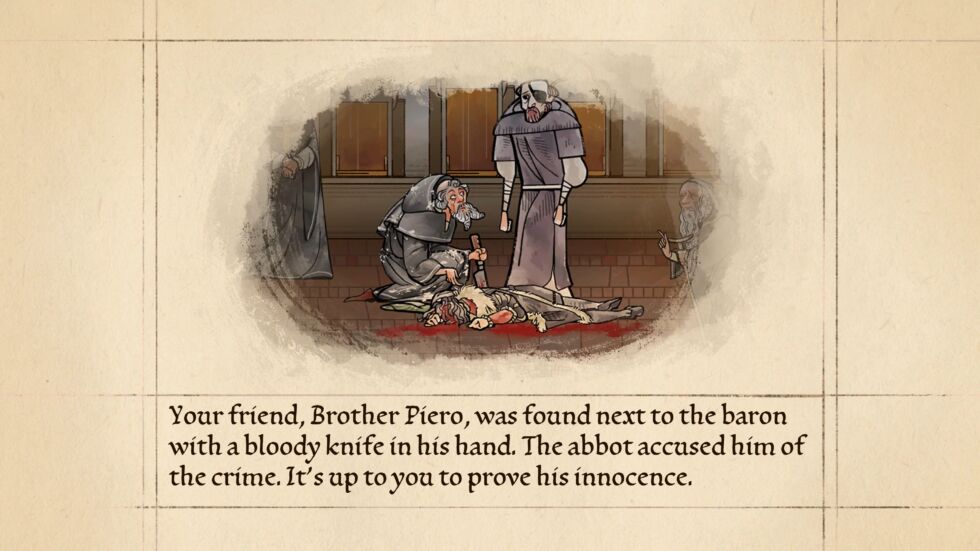Pentiment preview: Obsidian’s historical, religiously charged murder mystery

Since its reveal earlier this year, new video game Pentiment has been shrouded in secrecy and confusion. We knew it was being developed by Obsidian Entertainment, yet we also thought it might be a wild divergence from that beloved studio’s biggest hits (Fallout New Vegas, The Outer Worlds).
That suspicion was confirmed last week in a pre-Gamescom conference hosted by its gameplay director and art director, who comprise one-sixth of its full development staff. You read that correctly: Obsidian’s first video game since being acquired by the deep pockets of Microsoft will launch in November with a team of only 13 people on the credits.
Game director Josh Sawyer doesn’t mince words about this peculiar game’s budget and scope—nor about its corporate handlers finding the right place to put it.
“I’ve wanted to make a historical game for a long time, but I can’t remember the exact moment where I said, ‘What if it was a narrative adventure and very small?'” Sawyer says in a video conference. “I will say, it wasn’t until Microsoft was going to acquire us that I thought, we can do this now”—he pauses with a nervous laugh—”for two reasons.” Those being, Microsoft had suggested in the acquisition that the studio could explore “unusual and experimental” fare, and Microsoft’s subscription-driven Game Pass platform might be a better fit than traditional retail for a game like Pentiment: an accessible, non-combat, decision-driven murder mystery set in the wake of the tumultuous Protestant Reformation. “Whatever ideas I had about maybe doing something like this, they didn’t seem achievable until Microsoft acquired us.”
Sadly, not a good time period for David Caruso’s sunglasses

Everything I’ve seen and read about Pentiment leans into this kind of game-publishing serendipity, where a publisher has a vested interest in unique-looking games that don’t lean on existing IP (aka, might struggle as a crowdfunded pitch) and don’t have to sell for $60 or more on store shelves. And it’s grand luck for Sawyer, who admits he spent his college years studying German history after being inspired by his own family’s unclear genealogy, which eventually led him to deeply research the Bavarian period this game is set in.
-
Andreas’ narrative is pre-defined in some ways, but players can guide other elements of his story based on decisions made in the game, along with pre-gameplay determinations about his personality.
-
Decisions…
-
…decisions…
-
…decisions.
Obsidian describes Pentiment as a “narrative adventure with RPG elements,” and its team leads repeat this like a mantra: “narrative adventure,” and “not an RPG at its heart.” Yet, the designers also emphasize the game’s constant threads of tough decisions and moral gray areas that follow lead character Andreas, an artist living in a small Bavarian village in the early 1500s, over the course of many years. The game begins with Andreas learning that his best friend has been accused of a murder that he didn’t commit, then realizing he’s his friend’s only advocate. You spend the rest of Pentiment trying to solve exactly who did commit that murder, only to see Andreas become a small-village detective who investigates other crimes over the years.
-
When any historically accurate phrase is confusing in the game, tap a shortcut button to check out a glossary full of relevant definitions.
-
The same system can remind you of what a named character looks like, which might spur your memory about prior interactions.
Sawyer makes clear that Andreas has finite resources available as a detective in an era that didn’t really have detectives, let alone forensics or, really, much in the way of formal crime investigations. “There’s lots of ambiguity,” Sawyer says. “And you eventually have to pin each murder on somebody, but it’s never going to be clear if that’s really the person. You can use your best judgment or pick the person you want to see go!” he adds with a laugh.
He suggests that decisions big and small accumulate in the course of the game’s many years, and players also have to be mindful that they can only take so much time with village denizens along the way. During a large meal in the middle of town, the choice of who you sit with not only impacts who you gain intel from but also may affect anyone you do not sit with; or you may make conversational choices in the middle of town that others may overhear and keep track of. Sawyer is careful to clarify that these systems have limits: “There are no [visible] meters [tracking people’s emotions]. Just try to track things that seem like characters pay attention to, and the game will let you know when they’re paying attention and when [those topics] come up again.”
https://arstechnica.com/?p=1875731